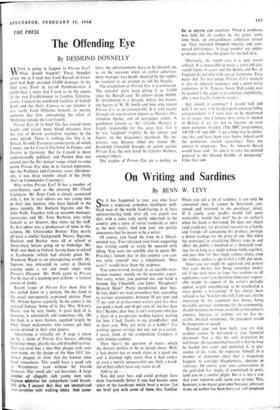THE PRESS
The Offending Eye
By DESMOND DONNELLY
11/4111/4Tukr is going to happen to Private Eye? What should happen? These thoughts struck me as I read that Lord Russell of Liver- pool had been awarded f5,000 damages in his libel case. 'Even in far-off Pembrokeshire I could hear a noise that I took to be the cheers of the real Establishment in London. Unfortu- nately, I lacked the combined facilities of Jodrell Bank and the Daily Express to see whether it was really Lord Dilhorne himself, or merely someone like him, announcing the relief of Mafeking outside the Law Courts.
Private Eye, in its brief life, has caused more laughs and raised more blood pressures than the rest of British journalism together in the same period. There is nothing else like it in Britain. Its only European counterparts, of which I know, are Le Canard Enchain in France, and Pardon in Germany. But Le Canard is more sophisticatedly political; and Pardon does not extend into the Der Spiegel range, which to some extent Private Eye does in its factual exposures, like the Profumo and Courtney cases. (Incident- ally, it was three months ahead of the Daily Mail on Commander Courtney.) Who writes Private Eye? It has a number of contributors, such as the amazing Mr. Claud Cockburn. Mr. Peter Cook is closely associated with it, but its real editors are two young men in their late twenties who have figured in the press recently, Mr, Richard Ingrams and Mr. John Wells. Together with an accounts manager, secretaries, and Mr. Tony Rushton, who styles himself as art director, they make up the staff. Its first editor was a predecessor of mine in this column, Mr. Christopher Booker. They nearly all have a similar background. Messrs. Ingrams, Rushton and Booker were all at school at Shrewsbury before going on to Oxbridge. Mr. Wells met them at Oxford, having been to school at Eastbourne (which had already given Mr. Woodrow Wyatt to an unsuspecting world). Mr. Ingrams was interested in satire at Oxford, causing quite a stir and much anger with Parson's Pleasure. Mr. Wells came to Private Eye by way of a teaching post at Eton—a natural course of events.
Recent issues of Private Eye show that it has settled down to a pattern. On the front is the usual outrageously captioned picture. Poor Mr. Wilson figures regularly. In the centre is the satirical fantasy. Some of it, like 'Mrs. Wilson's Diary,' can be very funny. A great deal of it, however, is amateurish and sometimes silly. On the back is a news feature, supplied largely by Fleet Street malcontents who cannot get their stories printed in their own papers.
Advertising is virtually nil. A page is taken up by a form of Private Eye bazaar, offering lurid beer mugs, ghastly ties and dreadful scarves. You can even buy a nice blue plaque with your own name, on the design of the blue LCC his- torical plaques to show that the famous once lived somewhere. This could have a good sale at Westminster, even without Sir Gerald Nabarro. The 'small ads.' are fearsome. A large number of allegedly rich young men with Jaguars ilichiertise for sympathetic, {and, beauti- ful) girls. I suspect that they are unemployed over-seventies with walking .sticks. And some-
times the advertisements have to be cleaned up, as on the occasion when an earlier advertise- ment manager was deeply shocked by the replies he received to an attempt to sell his bicycle.
The circulation of Private Eye is a confusion. The national press keep giving it as 11,000 since the Russell case. Its editors claim 40,000. Its distribution is a miracle, before the frown- ing figures of W. H. Smith and Son, who regard Private Eve as an untouchable. It is sold mostly through an organisation known as Moore's Dis- tribution Agency and on newspaper stands. A gentleman known as 'Sir' Charles Harness is largely responsible for this great feat. For it he was 'knighted' (rightly) by the editors and figures on the magazine's masthead. He im- presses, too, because when my friend Mr. Randolph Churchill brought an action against Private Eye, the writ listed Sir Charles Harness, amongst others.
The readers of Private Eye are a motley, as
far as anyone can ascertain. When a jamboree was held for its readers by the paper some time back, an extraordinary collection turned up. They included blimpish lunatics and com- mitted left-wingers. A large number are under- graduates who buy the paper for the hell of it.
Obviously, the recent case is a very severe setback. It is impossible to make a years-old joke sound funny in court and the Bench and Bar of England do not mix with savage lampoons. They never did. To that extent Private Eve's strength is also its inherent weakness and a good many jamborees in St. Pancras Town Hall could now be needed if the paper is to continue indefinitely, plus a new loyalty from its readers.
But should it continue? I should huff and puff, I am sure, with the best parliamentary lobby correspondents if I were ever to be mentioned in its pages. but I believe that satire is needed in Britain if we are not to become an even more pompous Sweden. (The BBC programmes, TWTWTW and BBC 3, go a long way to under- line this and have been very funny indeed until the politicians started squealing.) Thus my answer is emphatic : Yes. As Aneurin Bevan would have said : 'Its aim is to take the pointed poniard to the bloated bladder of pomposity.' I like that aim:


































 Previous page
Previous page